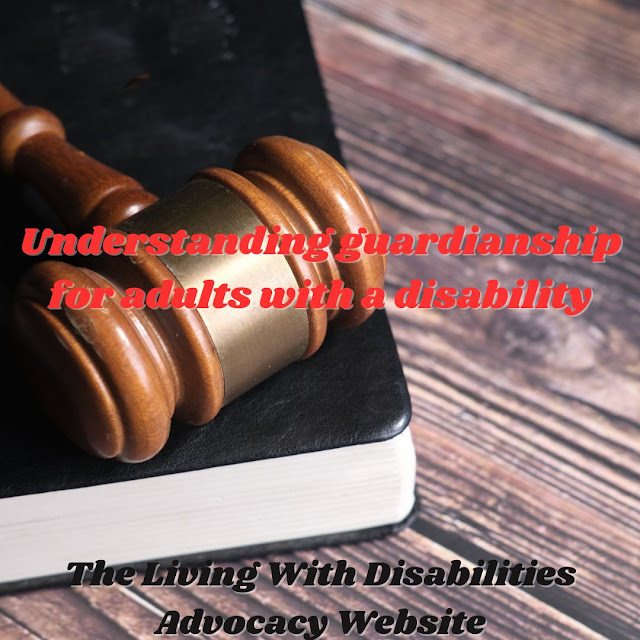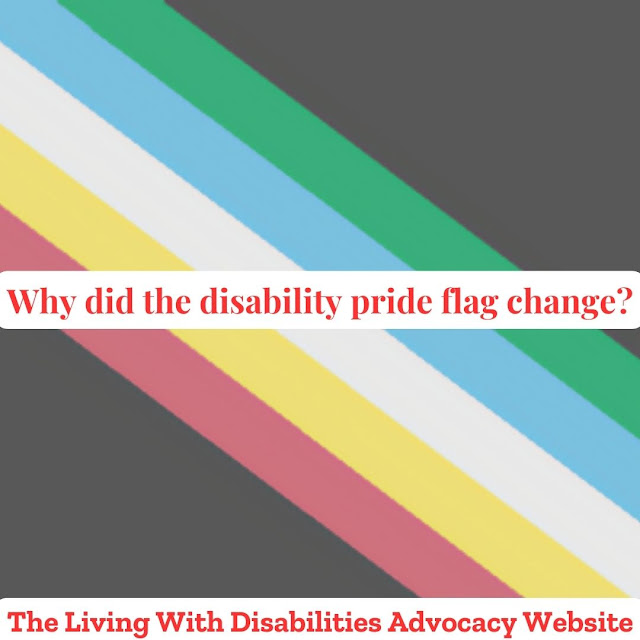Understanding guardianship for adults with a disability
If you're a new visitor to this advocacy website, this page aims to increase public understanding of those with disabilities and other conditions.
We suggest you seek a licensed professional counselor or healthcare provider for anything you read on this site.
This week, Living With Disabilities will touch base on Understanding guardianship for adults with a disability.
For the majority of individuals, if not all adults, who have caregivers or parents who have guardianship over them, talking about the disabled population can be extremely sensitive. Few individuals who have disabilities themselves comprehend this idea or the rationale for a person's caregivers or parents continuing to act as guardians as they age.
What is guardianship? when a person is legally obligated to take care of someone who is unable to take care of themselves.
The extent of a person's handicap will decide whether a legal duty is required, and the court, not medical professionals, will make this determination. At a hearing to determine if the individual is incapacitated and in need of a guardian, the court is presented with evidence (testimony, written capacity evaluation). The court has the authority to approve the petition, alter it, award fewer powers than asked for, and choose those nominated.
Guardianships should only be utilized when absolutely essential to further the person's disability welfare. That may entail safeguarding the individual from abuse, exploitation, or neglect as well as promoting the growth of their highest level of independence and self-reliance.
What different kinds of guardianship are there?
Types of guardianship may differ from state to state. It is crucial to speak with your special needs planning attorney and financial adviser, as well as look for local information at your state's advocacy group or guardianship association. Below is a list of some of the guardianship arrangements that are most frequently used:
There are four types of guardianship, full guardianship, limited guardianship, and short-term guardianship.
1. Full guardianship: accountable for overseeing the protection of the disabled person, also known as the protected person. The guardian is not required to pay for the protected person's costs out of pocket, to watch over them on a daily basis, or even to reside with the protected person. The guardian is in charge of making decisions for the majority of medical treatment, education, vocational planning, and end-of-life decisions. They must make an effort to ensure that the protected person is receiving the required care, housing, and supervision.
2. Limited guardianship: may only apply to specific types of decision-making, such as choices regarding medical care, so order to maintain the protected person's autonomy in all other areas. A restricted guardianship has the advantage of allowing for the least restrictive tailoring of the guardian's duties to the covered person's unique requirements. Additionally, the protected person has not been deemed incompetent while under restricted guardianship.
3. Short-term guardianship: permits someone to be a child's legal guardian before the general guardianship hearing.
4. Guardian of the estate: should be considered for persons with disabilities who are unable to manage their finances and have income from sources other than benefits checks, or have other assets and/or property.
5. Successor guardian: a replacement guardian in the event that the existing one passes away.
How long do the responsibilities last as guardianship? Guardianship ends when the person who is being protected dies. This also implies that if the guardian dies, is unable to must carry out their responsibilities or file a petition with the court requesting that guardianship of the person end. The parents' chosen replacement guardian will frequently be chosen by the court as the new guardian.
What are the guardian's financial responsibilities? In general, the guardian is held accountable for managing the person's finances but is not personally liable for the resources owned by the protected person.
A special needs trust may be created for a protected person, and a trustee will be chosen to oversee the administration of the trust's assets. The guardian will ask the trustee for money to support the protected person's household and pay for things like vacations, clothing, and other expenses for the protected person. As the trustee may refuse to make some required distributions if the guardian and trustee have a problem, it is crucial that the two parties establish a courteous and trusting relationship.
Note: A person with a disability does not automatically lose their ability to be mentally and physically independent just because they have a guardian. Other factors that they might not be able to comprehend or handle on their own led to the establishment of guardianship. Furthermore, it shouldn't be criticized because of the guardianship; rather, it should be seen as a necessary form of adaptation for daily living.
Living With Disabilities Presents: The Advocacy Table
a space created for people with disabilities to be able to have freedom of speech and talk on different topics surrounding the disability community. To get more details, check out The Advocacy Table. To become a panelist, Write into the show and let the host know what topic you want to talk about. She will then send out a group email to all panelists after the show has reached five or ten people. After the show, a survey will be emailed to you, and we would love to get your feedback.
If you need online support, Disability Safe Haven is great for receiving support. The We Care Team is very protective of its members and asks everyone who joins, to have a profile picture and answer the security questions.
Reference Link
https://www.americanbar.org/groups/senior_lawyers/publications/voice_of_experience/2022/voice-of-experience-february-2022/understanding-guardianship/#:~:text=Guardianships%20should%20only%20be%20used,maximum%20self%2Dreliance%20and%20independence.
https://www.specialneedsplanning.com/10-faqs-about-guardianship-of-adults-with-disabilities#:~:text=A%20guardian%20of%20the%20person,live%20with%20the%20protected%20person.
Spreading awareness will go a long way toward creating a solid foundation for those who desire to pursue higher education. Your purchase is important!



Comments
Post a Comment